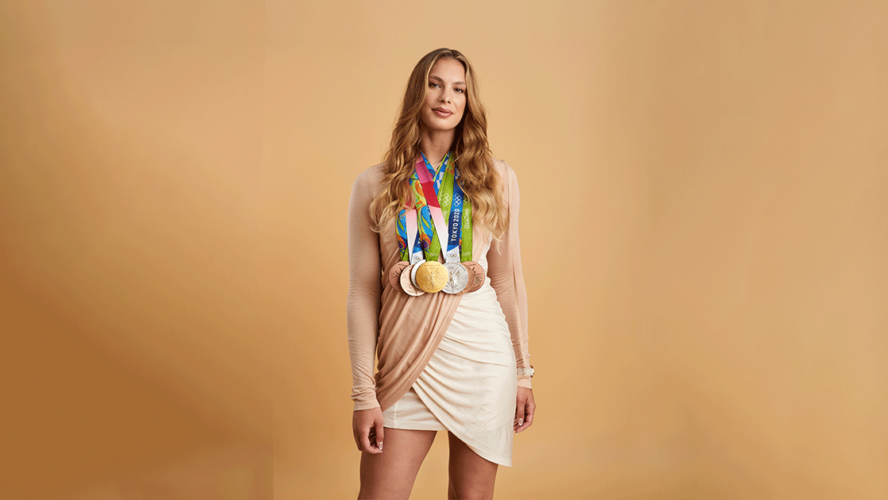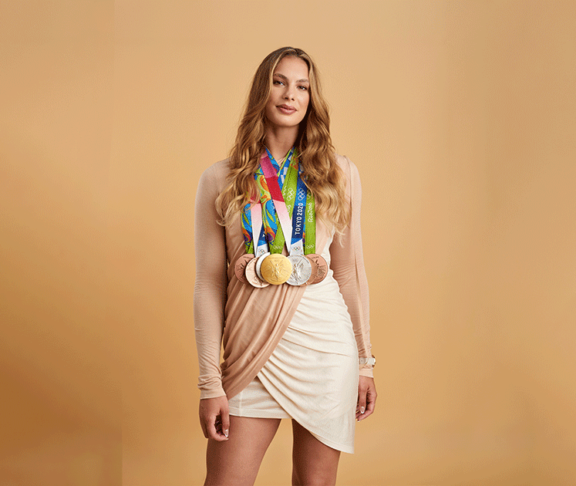
You’ve been very open and vulnerable about your battle with burnout, stress, and anxiety. When did you know to seek help and how did you first seek help?
My initial battle with stress and anxiety started like most kids: in high school. Figuring out life, friends, and interests is already incredibly difficult on young people; I then added another layer of stress when I reached unexpected success in the Olympics at 16. I became way more conscious of my surroundings, the expectations I placed on myself, the expectations of other people, the pressure to succeed and have continuous gradual success, and how I had to do it all with grace. It all became a lot of weight for a 16-year-old to bear and I think it took a couple of years for anyone to realize how much I was truly struggling. I started seeking help around 17 through the doctors I worked with at the centre I swam at, and I still use those people for assistance today.

What are the sources of stress and anxiety that you face as an athlete/role model?
There are constantly different stressors we all face day to day in life. As an athlete, this manifests in many ways, whether it’s dealing with external pressure of what a country is expecting of me, to internal pressures of what I’m expecting of myself. I think the biggest challenge you face as an athlete is the challenge of dealing with setbacks and injuries. Injuries are a part of the lifestyle, and they can determine an athlete’s whole fate. Knowing that it’s not going to always be a smooth ride, that you need to learn to roll with the setbacks and keep trying to push yourself forward, is the biggest source of stress any athlete deals with.

Is there a healthy way to balance the inevitable competitiveness and pressure to succeed that comes with being an athlete?
There’s an incredibly healthy, but not necessarily easy, way to find this balance. The key is finding the reason why you want to succeed in the first place. If your reasoning is from external stressors and pressure to succeed, it will be nearly impossible. I know this from personal experience. Competitiveness will come with putting yourself in positions to compete and getting yourself locked in. I think a way to find a healthy competitive balance is by finding people you enjoy competing against and people who push you, in and out of the training environment. For me, that’s Kayla Sanchez. She’s incredibly driven outside of the pool, yet will do whatever it takes to be the best version of herself in the water as well. This brings out a healthy competitive drive in me and pushes me to also want to be better in and out of the pool.

What’s been the most effective source of stress/anxiety relief for you in particularly hard times? Do you have a specific hobby you engage in, a supportive social circle you rely on, etc.?
The most effective source of stress/anxiety relief for me has been surrounding myself with good people. Whenever I’m struggling or just feel anxious about where I’m at, I tend to lean on those around me for support. I am beyond lucky to be surrounded by so many insanely strong and supportive people in my life who have also dealt with their own trials and tribulations. They provide an immensely impressive outlook on life from so many different perspectives, which I actively try to implement into my own life.

You were 16 when you first competed in the Olympics and became well-known on the world stage – what advice would you give to your 16-year-old self in hindsight and/or to other young people who might be struggling right now?
I would tell her to trust herself more. When I was 17, I decided that I wanted to live alone and to start figuring out how to navigate the world truly on my own. Initially, I didn’t have a lot of confidence in the decisions I made and found myself looking to others to tell me how to act or think; it was difficult for me to be fulfilled by my decisions when doing this. I found that once I started trusting my own opinion and making and learning from my own mistakes, I gained a lot of clarity in what I found the most fulfilling in my day-to-day life. It’s always scary taking that step to having the confidence to trust yourself, but I think you tend to learn and appreciate the things you do when you are truly doing them for yourself.


